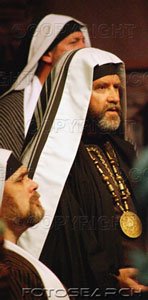Pasolini's "The Gospel According to St. Matthew"

I recently purchased Pasolini's great masterpiece The Gospel According to Saint Matthew. Though I haven't finished the movie, it is quickly becoming one of my favorite film adaptations of the gospel story. What I really like about this film is its portrayl of Jesus via only one of the gospels, that of Matthew. Too many Jesus' films take the route of many conservative scholars and attempt to harmonize the gospel story thereby eliminating the diversity inherent in the four different gospel accounts.
Watching Pasolini's movie brought into clearer perspective just how disjointed and seemingly unconnected some of the narratives are within the different gospels. At one point during the film I was reminded of something E.P. Sanders pointed out in his Jesus and Judaism. One of Sanders more controversial points was his insistence that the Pharisees were not a dominent group in Palestine, but were a small group located mostly in Judea. Furthermore, he viewed many of the debates between Jesus and the Pharisees as probably not authentic. Sanders explains why in the following:
"The extraordinary unrealistic settings of many of the conflict stories should be realized: Pharisees did not organize themselves into groups in the hope of catching someone transgressing (Mark 2:23f.), nor is it credible that scribes and Pharisees made a special trip to Galilee from Jerusalem to inspect Jesus' disciples' hands (Mark 7.1f). Surely stories such as these should not be read as describing actual debates between Jesus and others." (p. 265).
The forcefulness of this statement didn't really hit me at the time of reading it. But after watching Pasolini's film I now understand better what Sanders was getting at. In the film, when it comes to the scene where the disciples begin to pluck grain for themselves on the Sabbath, it follows Matthew's text (Matt 12ff) to an almost exact degree. As the disciples begin to pluck the grain, a Pharisee seems to come out of nowhere to condemn what they are doing. I was struck by the ridiculous nature of that scene because of the Pharisee's abrupt appearance. This immediately reminded me of this passage by Sanders and I quickly realized that he was right. Some of these debate settings are pretty absurd and probably didn't occur the way they are narrated. But it took seeing this worked out "visually" to help me perceive this. Such is the wonder of film I suppose.
At any rate for those of you who have not seen Pasolini's film, I highly recommend you get a copy of it. It stays truer to the story of Jesus better than many of the Jesus films made subsequent to it.


For an atheist and a homosexual, he made a pretty good "Jesus" film.
Posted by Michael F. Bird |
9:42 AM
Michael F. Bird |
9:42 AM
I like very few Jesus films, but this is one of them. (Passion of the Christ and Jesus of Montreal are the other two good ones.)
Posted by Loren Rosson III |
7:01 AM
Loren Rosson III |
7:01 AM